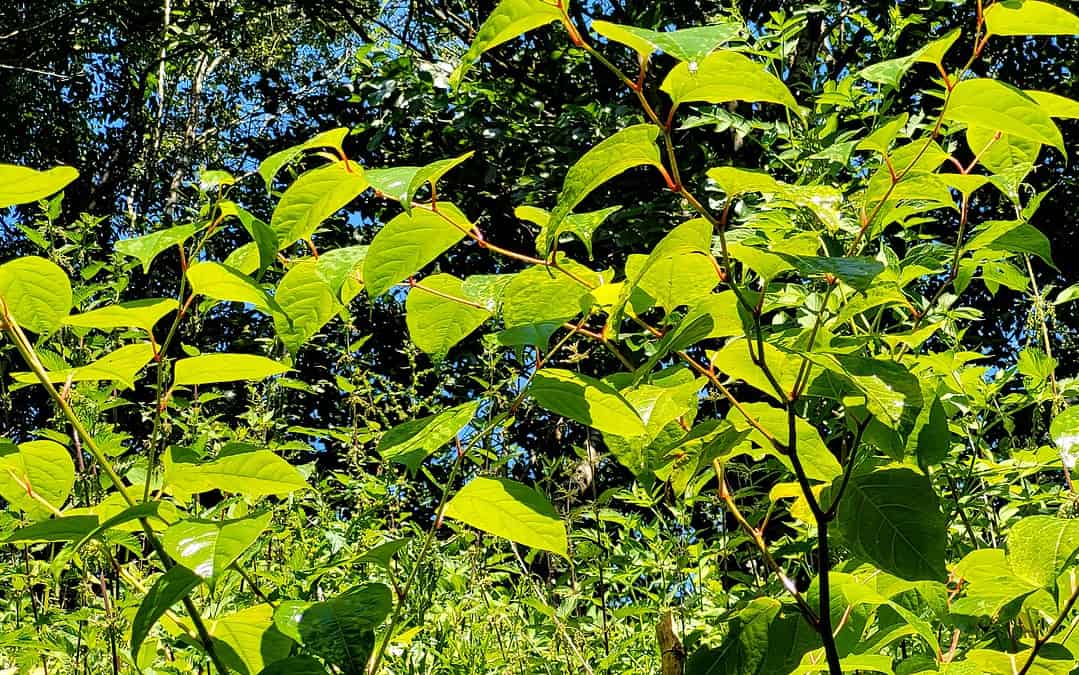What are the positive effects of Japanese knotweed?
Japanese knotweed (Fallopia japonica) is primarily considered an invasive plant species
And is known for its negative effects on the environment, infrastructure, and property. However, there are a few potential positive aspects associated with Japanese knotweed. I get asked all the time What are the positive effects of Japanese knotweed?
Erosion Control:
In some cases, the extensive root system of Japanese knotweed can be useful for stabilizing soil and controlling erosion on steep slopes or riverbanks. Its dense growth can help prevent soil erosion in certain situations.
Wildlife Habitat:
While Japanese knotweed can outcompete native plant species, its dense stands can provide temporary shelter and habitat for certain wildlife, particularly in disturbed or urban areas where natural vegetation is limited.
Birds:
Small birds, such as sparrows and finches, may take advantage of the dense stands of Japanese knotweed for shelter and protection from predators.
Insects:
Various insects, including bees, butterflies, and other pollinators, may seek refuge among the plant’s foliage or use it as a food source, especially when it produces flowers.
Small Mammals:
Small mammals like mice, voles, and shrews might find temporary cover and protection in the dense growth of Japanese knotweed.
Amphibians and Reptiles:
Some amphibians, like frogs and toads, and certain reptiles may use the plant for cover and protection from predators or extreme weather conditions.
- Traditional Uses: In certain cultures, Japanese knotweed has been used in traditional medicine for various purposes, though scientific evidence supporting its medicinal efficacy is limited. It has been historically used in some Asian countries for conditions such as respiratory issues, gastrointestinal problems, and cardiovascular health, but these uses are not widely recognized in modern medical practice.
Historical Context of Usage
Japanese Knotweed’s usage in medicine traces back centuries, particularly in countries like China, Japan, and Korea. Traditional healers and herbalists held the plant in high regard, believing it contained properties beneficial to human health.
Primary Traditional Uses
Respiratory Ailments:
In traditional medicine, Japanese Knotweed was often prescribed as a remedy for respiratory problems, such as coughs, bronchitis, and asthma. The belief was that the plant could alleviate inflammation in the respiratory tract, providing relief from symptoms.
Gastrointestinal Concerns:
Herbal concoctions made from the plant were commonly used to treat various digestive problems, ranging from simple indigestion to more severe issues like diarrhea and stomach ulcers.
Cardiovascular Health:
Some traditional practitioners believed that Japanese Knotweed could strengthen the heart and improve blood circulation. This belief stemmed from the plant’s supposed ability to cleanse the blood and fortify the cardiovascular system.
Antioxidant Properties:
While modern research has indicated that Japanese Knotweed is a source of resveratrol, a natural compound with antioxidant properties, traditional healers recognized the plant for its potential to combat oxidative stress, though they may not have described it using contemporary terminology.
Modern Science’s Viewpoint
While these traditional uses paint a beneficial picture of Japanese Knotweed, it’s essential to consult modern science for a well-rounded understanding:
Limited Clinical Evidence:
Despite the historical significance, there’s a lack of extensive clinical research validating the therapeutic properties attributed to Japanese Knotweed. Some studies do indicate potential benefits, especially related to resveratrol, but these are preliminary and require further investigation.
Not a Mainstream Medical Treatment:
It’s crucial to note that while Japanese Knotweed has historical significance in traditional medicine, it isn’t recognized as a standard treatment for any medical conditions in contemporary medical practices worldwide.
Potential Side Effects:
As with many herbs, consuming Japanese Knotweed, especially in large quantities, can lead to potential side effects. It’s always advisable to consult a healthcare professional before incorporating any new remedy into one’s health regimen.
It’s essential to note that the potential positive effects of Japanese knotweed are generally outweighed by its significant negative impacts on the environment, infrastructure, and human activities. Its rapid growth, ability to spread and regenerate, and potential to damage property and natural ecosystems make it a problematic and unwanted plant in many regions.
To mitigate the harm caused by Japanese knotweed, various countries have strict regulations and guidelines in place to manage and control its spread. It is crucial to follow best practices for its control and disposal to prevent further infestations and minimize its impact on the environment and society. If you encounter Japanese knotweed on your property, it’s advisable to seek professional advice from experts in invasive plant management.
